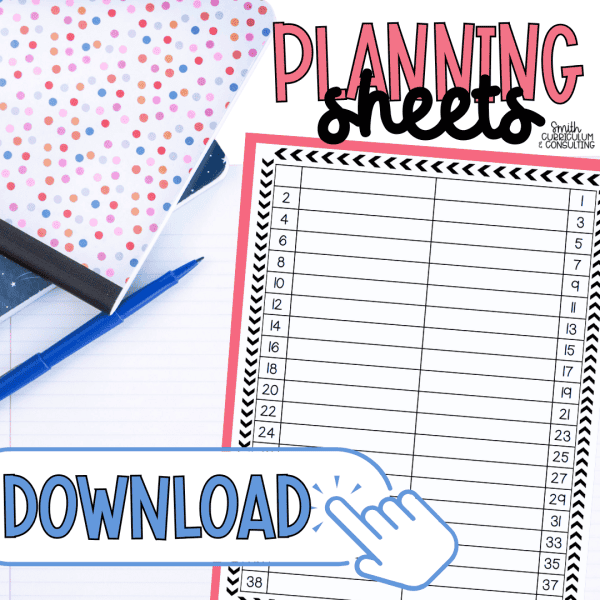Today, I am so excited to bring to you a guest post that many of you have been begging for! Dr. Cory Bennett of Bennett Educational Consulting and Associate Professor of Education at Idaho State University recently opened my eyes on how to effectively incorporate Number Talks in the Middle School classroom while I was at NCTM Annual Conference. So much so that I almost immediately asked him (I might have begged a little) to come over and share with us his knowledge based on the years that he has been implementing them with teachers that he works with. Thank you, Dr. Bennett, for taking time not only to share this knowledge with me but also with my readers!

What are Number Talks?
Number talks are a highly effective way to help students learn to communicate mathematically, attend to the nuances in strategies, and develop fluency. Essentially, students have opportunities to learn to think and behave like a mathematician, which is central to their short-term and long-term growth in mathematics.
Number talks are often short, five to ten minute, whole-class moments wherein students mentally calculate solutions to computational exercises to develop flexibility in thinking and reasoning. Students then discuss their ideas, attending to the “why” instead of just “how.” The teacher records the student’s thinking in a non-evaluative manner, probing for clarification if specific steps or decisions are unclear. While number talks have tremendous potential to support procedural and conceptual understanding, implementing number talks in the middle grades can be more challenging as the content becomes more advanced and does not always lend itself to simple calculations or computations.
Transitioning Number Talks for Middle School Students
However, most of the benefits of number talks—which include such things as making sense of mathematical contexts or situations, recognizing key elements in relationships, learning to reason about why these key elements matter, and practicing how to listen to their fellow students’ ideas as well as articulate understandings in a clear and logical manner—can still happen by attending to reasoning. Thus, Reasoning Talks might be a better way to describe the nature of number talks in the middle grades.
 Reasoning talks can look different and can have different outcomes. For example, a teacher might want students to recognize what is important about a problem/context. Do students understand what matters and how it matters? Or, students might be asked to make meaning of a symbolic representation. When examining a proportion, what do the two ratios mean independently and in relation to each other? Additionally, students might be asked to make connections between relationships. An example of this might include analyzing what is the same or different between a linear and non-linear function who have the same (or different) coefficients and y-intercepts. Other Reasoning Talks might focus on generating a possible solution pathway, developing questions, or developing a conjecture or considering a counter argument.
Reasoning talks can look different and can have different outcomes. For example, a teacher might want students to recognize what is important about a problem/context. Do students understand what matters and how it matters? Or, students might be asked to make meaning of a symbolic representation. When examining a proportion, what do the two ratios mean independently and in relation to each other? Additionally, students might be asked to make connections between relationships. An example of this might include analyzing what is the same or different between a linear and non-linear function who have the same (or different) coefficients and y-intercepts. Other Reasoning Talks might focus on generating a possible solution pathway, developing questions, or developing a conjecture or considering a counter argument.
Implementing Reasoning Talks
 As with any strategy that you try, this will take more time than you think it will (or want it to) at first but it will become easier to implement as you become more familiar with it. Also, the underlying success of Reasoning Talks goes beyond just deliberate practice, it begins with deliberate practice. Your planning matters tremendously here. My suggestion is to begin with answering the following questions first (see FREEBIE template for additional structure):
As with any strategy that you try, this will take more time than you think it will (or want it to) at first but it will become easier to implement as you become more familiar with it. Also, the underlying success of Reasoning Talks goes beyond just deliberate practice, it begins with deliberate practice. Your planning matters tremendously here. My suggestion is to begin with answering the following questions first (see FREEBIE template for additional structure):
- What should they be considering in the task you provide?
- How do you want them to consider this task or what do you want them to focus on?
- What mathematics will be involved or be the focus?
- And what questions will you ask to probe for clarity?
 Just as with number talks, Reasoning Talks aim to help students learn to communicate ideas and attend to critical aspects of the mathematics they are learning. This means one of the more critical roles of the teacher is keeping track of ideas in a central place (like on the white board), helping students attend to the key aspects of their thinking (they are not always aware of the importance of their ideas), and helping them make connections between their ideas and the ideas of others. In your practice, remember to attend to these three things and perhaps even add notes to yourself on the planning template to help you keep this focus. Otherwise, you may end up completing a Reasoning Talk and feel unsure your outcomes were accomplished.
Just as with number talks, Reasoning Talks aim to help students learn to communicate ideas and attend to critical aspects of the mathematics they are learning. This means one of the more critical roles of the teacher is keeping track of ideas in a central place (like on the white board), helping students attend to the key aspects of their thinking (they are not always aware of the importance of their ideas), and helping them make connections between their ideas and the ideas of others. In your practice, remember to attend to these three things and perhaps even add notes to yourself on the planning template to help you keep this focus. Otherwise, you may end up completing a Reasoning Talk and feel unsure your outcomes were accomplished.
And to Wrap Up…
Ultimately, Reasoning Talks are about students learning to think and behave like a mathematician. This takes time and practice and you may not ever get your students where you want them to be with this but they will be in a better place than before you started (next year’s teacher will be grateful for your work!). Also, be patient with yourself. Helping students learn to be sense makers and reason about mathematics is not easy but it is worth your time and effort. Perhaps the best advice I can give for those just starting out is to start small, work with others, and tap into professional communities that are willing to support your efforts. This school year may be winding down but it is not too late to start thinking about how you are going to start this work next year.
So, how could we (Cory and Jennifer) help you with Number Talks in your Middle Grades classroom? What are you looking for? What do you need more information about? Answer us in the comments below because rumor has it, we ARE listening!

Contact Information for Cory
Email: bennett.educational.consulting@gmail.com
Twitter: @Alohacory
Website: www.bennettconsulting.education
Teach Me About Math Workshop!
Looking for all the latest about using Math Workshop in the Middle Grades? Join today and grab the FREE Editable Math Workshop Sheets and all of the great emails to come your way!
Success! Now check your email to confirm your subscription.



